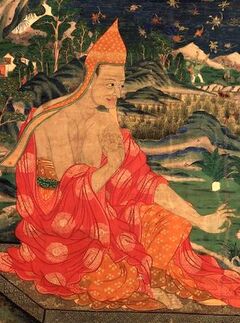Abhidharma Lineage Praise
༄༅། །དམ་ཆོས་མངོན་པའི་བླ་མ་བརྒྱུད་པ་རྣམས་ལ་བསྟོད་པ་བློ་གྲོས་ཀྱི་པདྨོ་རྒྱས་པར་བྱེད་པའི་ཉི་མ་ཞེས་བྱ་བ།
The Sun that Causes the Lotus of Intelligence to Bloom
In Praise of the Lineage of Gurus for the Noble Abhidharma
by Rongtön Sheja Kunrig
བླ་མ་དང་ལྷག་པའི་ལྷ་ལ་ཕྱག་འཚལ་ལོ། །
lama dang lhakpé lha la chaktsal lo
Homage to the guru and supreme deity.
ཆོས་ཀྱི་སྐུ་ལས་གཡོ་བ་མེད་ཀྱང་སྟེ། །
chö kyi ku lé yowa mé kyang té
Although you do not move from the dharmakāya,
སྣ་ཚོགས་ཞིང་དུ་སྤྲུལ་པའི་སྐུར་སྟོན་ཅིང་། །
natsok zhing du trulpé kur tön ching
You display nirmāṇakāya forms in manifold realms,
ཕྲིན་ལས་འོད་ཟེར་ཕྱོགས་བཅུར་རབ་འཕྲོས་པས། །
trinlé özer chok chur rab tröpé
And through emitting the light rays of activity in all directions,
འགྲོ་བའི་དོན་བྱེད་ཐུབ་དབང་ཞབས་ལ་འདུད། །
drowé dönjé tubwang zhab la dü
Accomplish the welfare of beings—to the Lord of Sages, I bow.
ཡང་དག་སྣང་བས་མ་རིག་མུན་སེལ་བ། །
yangdak nangwé marik mün selwa
An authentic light to dispel the darkness of ignorance
རྒྱལ་བས་གསུངས་པ་དམ་ཆོས་མངོན་པའི་མདོ། །
gyalwé sungpa damchö ngönpé do
Was the Abhidharma teaching given by the victorious one,
མཆོག་ཏུ་གསལ་མཛད་ཐོགས་མེད་དབྱིག་གཉེན་སོགས། །
chok tu sal dzé tokmé yiknyen sok
Excellently illuminated by Asaṅga, Vasubandhu and the rest—
ཆོས་མངོན་སྨྲ་བའི་ཉི་མ་དེ་ལ་འདུད། །
chö ngön mawé nyima dé la dü
To these suns of Abhidharma discourse, I bow.
འཇམ་དཔལ་དབྱངས་ཀྱི་མཁྱེན་རབ་འཛིན་བྱེད་པ། །
jampal yang kyi khyen rab dzin jépa
The holders of the wisdom of Mañjuśrīghoṣa—
རྒྱལ་པོའི་སྲས་དང་སློབ་དཔོན་གང་བ་སྤེལ། །
gyalpö sé dang lobpön gangwa pel
Jinaputra1 and Ācārya Pūrṇavardhana2
གནད་ཀྱི་སྒྲོན་མེ་མཛད་པའི་མཁྱེན་རབ་ཅན། །
né kyi drönmé dzepé khyen rabchen
And the one with the wisdom to create the Torch of Crucial Points,3
གཞན་ཡང་ཆོས་མངོན་སྨྲ་བ་རྣམས་ལ་འདུད། །
zhenyang chö ngön mawa nam la dü
To these exponents of Abhidharma, I bow.
གངས་རིའི་ཁྲོད་འདིར་ཆོས་མངོན་རྒྱས་མཛད་པ། །
gangri trö dir chö ngön gyé dzepa
Those who spread the Abhidharma in this land of snowy peaks,
ཆོས་ཀྱི་བརྩོན་འགྲུས་ཡེ་ཤེས་འབྱུང་གནས་དང་། །
chö kyi tsöndrü yeshe jungné dang
Chökyi Tsöndrü,4 Yeshe Jungne,5
བྲང་ཏི་དར་མ་སྙིང་པོ་ལ་སོགས་པ། །
drang ti darma nyingpo la sokpa
Drangti Darma Nyingpo and the rest—
སྨྲ་བའི་སེང་གེ་མཁས་པའི་ཚོགས་ལ་འདུད། །
mawé sengé khepé tsok la dü
To these learned lions of speech, I bow.
འཁོར་བ་བསྐྱེད་མཛད་ཉོན་མོངས་དུག་གསུམ་སྟེ། །
khorwa kyé dzé nyönmong duk sum té
The three poisons are afflictions that create saṃsāra,
རྩ་བ་མ་རིག་ཡོངས་སུ་སྤོང་མཛད་པ། །
tsawa marik yongsu pong dzepa
And ignorance, their root, is to be entirely eliminated.
ཤེས་རབ་བསླབ་པ་རྒྱུད་ལ་དབང་བ་སྟེ། །
sherab labpa gyü la wangwa té
With mastery of the wisdom training in our minds,
ཉོན་མོངས་དགྲ་ལས་རྣམ་པར་རྒྱལ་གྱུར་ཅིག །
nyönmong dra lé nampar gyal gyur chik
May we conquer the enemy of the afflictions.
ཆོས་མངོན་སྨྲ་བ་གུས་པས་རབ་བསྟོད་པའི། །
chö ngön mawa güpé rab töpé
Through the virtue of devotedly praising these exponents of Abhidharma,
དགེ་ཚོགས་གང་གིས་མ་རིག་མུན་བསལ་སྟེ། །
gé tsok gang gi marik mün sal té
May the darkness of ignorance be dispelled,
བློ་གྲོས་སྣང་བ་ཀུན་ནས་རྒྱས་གྱུར་པ། །
lodrö nangwa künné gyé gyurpa
As the light of intelligence extends far and wide,
ཐམས་ཅད་མཁྱེན་པའི་གོ་འཕང་ཐོབ་གྱུར་ཅིག །
tamché khyenpé gopang tob gyur chik
And may we attain the level of omniscience!
ཅེས་དམ་ཆོས་མངོན་པའི་བརྒྱུད་པ་ལ་བསྟོད་པ་འདི་རོང་སྟོན་ཆེན་པོས་དཔལ་ནཱ་ལེནྡྲར་སྦྱར་བའོ།།
The great Rongtön composed this praise of the lineage of noble Abhidharma at glorious Nālendra.
| Translated by Adam Pearcey, 2020.
Source: shes bya kun rig. "mngon pa'i bla brgyud la bstod pa blo gros kyi pad+mo rgyas par byed pa'i nyi ma." In gsung 'bum/ shes bya kun rig. Chengdu: si khron dpe skrun tshogs pa/ si khron mi rigs dpe skrun khang, 2008. (BDRC W1PD83960) Vol. 1: 296 - 297.
Version: 1.2-20220805
